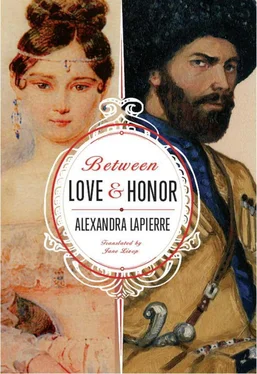kanly:complex code of the law of blood and vengeance of the Caucasus
khan:aristocratic title in the Caucasus, a prince
kibitka:small Russian carriage that runs on wheels in the summer and sleigh blades in the winter
kinjal:long, straight-bladed dagger
kokoshnik:traditional Russian tiara, obligatory apparel of ladies at court at official balls, by order of Nicholas I during his reign
Lesghien:tribe of the Caucasus, close to the Avars and Chechens
madrassa:Islamic educational institution, place of study
Montagnard:general term applied to all the Muslims of the Caucasus by the Russians. The Montagnards included Circassians, Kabardians, Ossetians, Chechens, Inguche, Lesgheins, and Avars
murchide:spiritual guide of the Caucasus
murid:disciple of a Sufi sheik, warrior of Shamil
murtaghazet:combatant from an aul
naïb:war chief of Shamil, with powers over a specific region
Naqshbandi:Sufi fellowship to which Shamil belonged
padishah:title of the sultan of Constantinople, emperor
papakha:tall lambskin hat
qadi:Sharia-based religious authority with the power of a judiciary
ruble:unit of Russian currency worth about fifteen euros in 1850
saklia:house in a Montagnard village
seraglio:word used in the sense of a harem, part of a house reserved for women
Sharia:the law of God
shashka:a slightly curved saber, worn as a bandolier in the Caucasus
surat:chapter of the Koran
Tariqa:the path to God
ukase:edict pronounced by the czar
verst:distance corresponding to about seven-tenths of a mile
zikr:method of prayer leading to mystical ecstasy and direct union with God
List of Main Characters and Place Names
Abdul Aziz:surgeon in the Dagestani village of Untsukul, maternal grandfather of Jamal Eddin.
Akbirdil:one of Shamil’s naïbs, who insulted General Klüge von Klugenau during the meeting at Chirquata in September 1837.
Akulgo:village of Dagestan that served as Shamil’s fortress-headquarters from 1837 to 1839. The Russians besieged the village in the summer of 1839. Czar Nicholas considered its capitulation as a triumph that marked the end of the wars of the Caucasus. On September 5, 1839, he had a medal struck to commemorate the victory and awarded it to all officers, noncommissioned officers, and soldiers who had fought at Akulgo.
Alexandra Feodorovna (czarina, wife of Nicholas I)(July 1798–October 1860): married in July 1817. Their first son, the future Alexander II, was born on April 17, 1818, followed by three girls and three boys.
Alexandra Nicolaïevna (Adini):third daughter of Czar Nicholas I and Czarina Alexandra Feodorovna, born in 1825, married in 1843, died in 1844.
Alexander I (Pavlovitch):czar from 1801 to 1825, elder brother of Nicholas I, conqueror of Napoleon.
Alexander II:first son of Nicholas I, born at the Kremlin April 17, 1818, assassinated in 1881. Married Maria of Hesse-Darmstadt (Maria Alexandrovna) April 28, 1841. Assumed the throne upon the death of his father in February 1855. Was crowned after the Crimean War ended in 1856.
Alexandrovsky Cadet Corps of Tsarskoye Sielo(Christmas 1839–August 1841): elementary school for children ages six to nine, sons of poor or deceased officers. Their schooling was conducted by women under a male director. Jamal Eddin was transferred there after spending September to December 1839 with the First Cadet Corps of Moscow.
Ali Bek al-Kunzahki:naïb who defended the tower of Surkhaï at Akulgo.
Andi Koysu:river at the foot of Akulgo, one of whose tributaries is named Ashilta, like the village.
Ashilta:native fief of Shamil, where he was consecrated imam in 1834. Destroyed by General Fézé May 13, 1837.
Bahou-Messadou:Jamal Eddin’s paternal grandmother.
Baratachvili, Nina (Princess Nina Baratov):Born in 1837, niece of Grigol and Elico Orbeliani. In 1854, at age seventeen, she was taken hostage with the entire household of Sinandali in a raid by Shamil’s men.
Bariatinsky (Prince Alexander Ivanovitch):Caucasian viceroy who accepted the surrender of Shamil at Gunib in 1859.
Barti Khan:Shamil’s maternal uncle, assisted Shamil at Akulgo.
Bashlik-Atslikar:battle near Oguzlu in Turkey, where Varenka’s husband, Elico Orbeliani, was killed in 1854.
Buxhöwden, Count Sergei Petrovich(1828–1899): close friend of Jamal Eddin. They met in the First Cadet Corps. On January 15, 1855, Buxhöwden was among those who accompanied him to the Caucasus.
Burnaya:“The Stormy,” a Russian fort.
Chavchavadze, David Alexandrovitch(Tiflis, August 26, 1817–November 15, 1884): only son of Georgian poet Prince Alexander Garsevanovitch Chavchavadze and Princess Salomé Ivanova Orbeliani. His famous sister Ekaterina married Prince Dadiani and became sovereign of Mingrelia. His sister Nino married Griboledov, his sister Sonia, Baron Nicholas. David inherited the domain of Sinandali, from which his wife, Anna, and his entire family were kidnapped by Shamil July 4, 1854. He and Jamal Eddin became close friends during the few weeks they spent together at the Russian camp while negotiations for the exchange took place.
Chernychev, Alexander:became Nicholas I’s minister of war, after Czar Alexander died in his arms. All administrative questions concerning Jamal Eddin were addressed to him.
Chechnya:Caucasian region bordering on Dagestan.
Chirquata:Dagestani village, dependent upon Shamil.
Chuanete:Shamil’s fourth spouse, his favorite after Fatima’s death. Born in 1825, she died in 1876.
Constantine Nicolaïevitch(1827–1892): grand duke, second son of Nicholas I and younger brother of Alexander II.
Constantine Pavlovitch:grand duke, one of Nicholas I’s two older brothers, viceroy of Poland, who died of cholera during the Polish uprising of 1831. He should have succeeded Alexander I but abdicated the throne in favor of Nicholas I, a power vacuum that led to the Decembrist revolt.
Cooper, James Fenimore(1789–1851): one of Jamal Eddin’s two favorite novelists (the other being Sir Walter Scott).
Cadet Corps of Moscow(September–December 1839): after his abduction, Jamal Eddin was placed in the primary school division of the Cadet Corps of Moscow. He stayed there only three months, since there was no mullah to provide him with religious training.
Cottage of Peterhof-Alexandria:domain of the imperial family overlooking the Gulf of Finland, where Czarina Alexandra gathered her family and intimate friends. Jamal Eddin spent his summer vacations there from 1846 to 1850.
Dagestan:region of the Caucasus bordering on Chechnya.
Daniyal Bek:sultan of Elisou, one of the pillars of the Russian alliance, who rallied to Shamil in 1844. His daughter married Jamal Eddin’s younger brother, Mohammed Ghazi, in 1851.
Dargo-Veden:Shamil’s headquarters in Chechnya, where he held the princesses captive in 1854–1855.
Читать дальше












